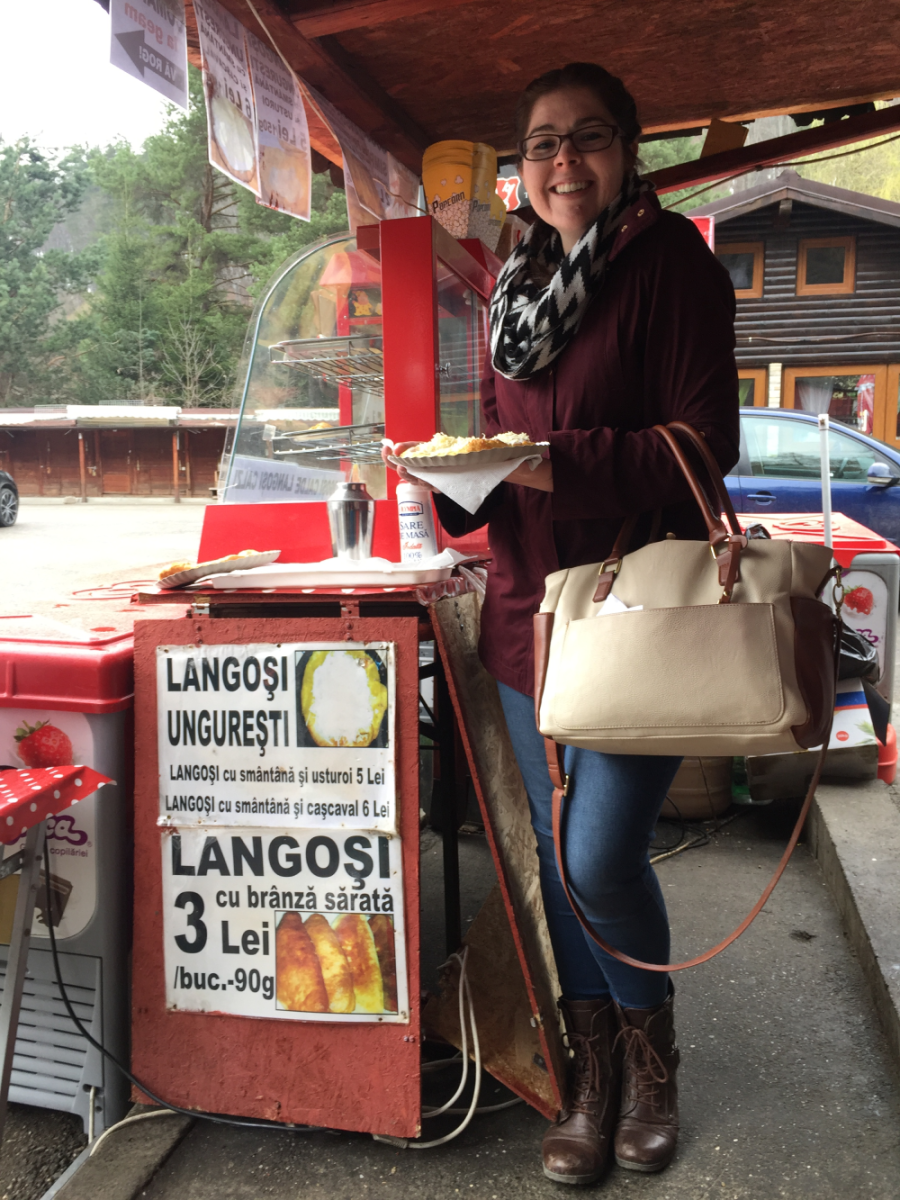Arriving in and exploring a new country is both exciting and richly rewarding – but having food allergies can add a complicating layer to that experience.
I was first diagnosed with a severe nut allergy as a child. It was a scary prospect knowing my body could have a dramatic and dangerous reaction if I ate the wrong thing and I very quickly had to get used to reading every ingredient label and keeping an EpiPen on hand.
A few years later, when I was about to board my first transatlantic flight, the only emotion that could compete with my excitement was worry about how I would manage my allergy on another continent.
And I am not alone. It is estimated that 32 million Americans have food allergies — and that doesn’t even take into account the rest of the world. For them, traveling internationally can feel daunting or even impossible. The stakes are high and there’s a lot to manage in an unfamiliar place and often an unfamiliar language.

Determining the safest options at every meal when you can’t read the menu, communicating an allergy when you can’t speak the language, knowing you may not able to find any safe food throughout the day, and the fact that tasting something you don’t recognize could land you in a hospital can all be anxiety-inducing realities to consider and plan around.
Moreover, awareness and understanding of life-threatening food allergies varies greatly around the world.
It may be understood that you can’t eat a specific ingredient, but not that you can’t eat anything that touched the same surface as that ingredient. In Bosnia and Herzegovina, after thinking I had clearly communicated my allergy situation, I was brought a rice dish and told to eat around the nuts. I don’t blame the waiter for this misunderstanding – allergies just aren’t common there – but needless to say, I skipped that meal.
Despite all these complicating factors, I’ve found that all of my trips have been so worth the extra thought and planning that went into them.
Since being diagnosed, I’ve explored over 20 countries with my allergy in tow.
I’ve had many of my most cherished experiences while traveling and I’ve learned a lot along the way, adapting my travel style to manage the risk inherent in having a food allergy.
Confidently facing the challenges that can come with travel can foster self-reliance and growth that will last long after you’ve returned home. Having food allergies means there are a few more things to prepare for, but they do not have to hold you back from taking the incredible trips on your list. I want to share my go-to strategies in the hope that they help anyone who is planning or wants to plan a trip abroad with a food allergy.
Here are my top 9 recommendations for staying safe and happy while leaving your comfort zone and traveling with a food allergy:
1. Get to know your destination’s cuisine.
 Do some research on what the locals eat and what you can expect to see on menus. What are the ingredients in their staple dishes? Are there any you will absolutely need to avoid?
Do some research on what the locals eat and what you can expect to see on menus. What are the ingredients in their staple dishes? Are there any you will absolutely need to avoid?
I usually consult Wikipedia for a list of common dishes and will also check travel blogs and message boards where other travelers have discussed their experiences with food and handling of allergies in that country or region. Even a quick search of TripAdvisor destination forums have led me to great information. If you have flexibility on your destination, these kinds of sources can also help inform a decision on where to travel next. Some of my favorites include:
- AllergyTravels
- Allergic Living
- Miss Allergic Reactor
2. Create or purchase allergy translation cards

Allergy translation cards are so helpful if you can’t speak your destination’s native language. They typically contain a brief description of your allergy and may even include pictures for absolute clarity.
I get mine at SelectWisely.com and bring several copies. If you will have mobile data or reliable WiFi, an app like Google Translate can help with this too, but I always like to have a real card on hand in case I don’t have access to an app.
Even if you know how to say that you have an allergy in another language, a card can eliminate any potential miscommunications. You don’t want a situation where a mispronunciation causes your waiter to only understand the word for your allergen and think you want it added to your food!
Allergies can sometimes be misunderstood as picky eaters’ preferences, especially in regions where food allergies are uncommon. Allergy cards can help to communicate the severity of a food allergy.
Read next: Gluten-Free Travel Tips: 5 Things to Do Before You Go
3. See your doctor and safely pack your medication
If you have any questions about your allergies, get them answered before you depart and talk to your allergist/doctor about an allergy action plan so you know what to do in an emergency.
Depending on where you’re going, you may consider visiting a doctor who specializes in travel. You’ll be able to get any recommended vaccines and information to take with you about the medical facilities in the areas you’re traveling to.
Make sure to get your prescriptions refilled if necessary and pack all important medications in your carry-on luggage. I always bring extra EpiPens and pack one in each bag. I’ve never had problems bringing them through customs or airport security, but I carry a copy of my prescription just in case.
You’ll also want to pack some over-the-counter antihistamines (Benadryl) and, depending on the severity of your allergy, wipes to clean off surfaces you’ll be eating off of. Plan to bring all your medications with you when you are out and about so they’re on hand at all mealtimes. I bring a camera bag that can also hold my meds, but if you want to be hands-free or are worried about theft, you could also consider a travel scarf with a built-in compartment for carrying your essentials.
4. Pack a supply of safe snacks from home.
Bring along plenty of your favorite non-perishable snacks and/or meal replacements so that you always have a stock of food you can feel safe eating. This can save you some stress and keep you safer if you’re in a place where your allergen is common.
You’ll want to keep some of your high-protein allergen-free snacks with you when you’re headed out for the day in case local snacks or street food won’t be safe for you.
Keep in mind that allergen labeling varies in different countries. Even brands you recognize from home may have different ingredients in different parts of the world, so be sure to check the full ingredients list if you do buy snacks locally.
5. Purchase travel insurance.
Travel insurance isn’t just for cancelled flights and lost luggage, it can also cover you in the event of needing medical care overseas or in more serious cases of medical evacuation if you are traveling somewhere without robust local medical facilities (this is more coverage than many domestic health plans would offer).
I recommend World Nomads; they are highly rated by Lonely Planet, offer extensive coverage options, and I have found them easy to use and reasonably-priced.
Make sure to disclose your allergies and any other pre-existing conditions when you purchase a plan – and read the fine print to make sure everything will be covered.

6. Prepare your own food when possible.
Consider staying in guesthouses, apartments, or hostels that have kitchens where you can cook your own meals – this has the added bonus of saving you some money, too.
Being able to pick out and prepare your own ingredients at local markets and stores can keep you safer and take much of the stress out of mealtimes abroad as you’ll be in full control of ingredients and preparation. And checking out the local grocery store in a new country is always a fun way to get acquainted with a new place.
Of course, it’s not always possible on the road to do this. If you’ll be in a situation where a host will be providing meals or cooking for you, be sure to contact them in advance to communicate your dietary restrictions. This can also apply to airlines if airborne exposure to your allergen is a concern.
7. Order simply.
Order less-complicated dishes with fewer ingredients. This strategy is certainly not fool-proof (always remember the risk of shared preparation areas in kitchens), but it will be easier to identify what is in your food if the ingredients are prepared more plainly and kept separate on the plate. I often order items that are less likely to be cooked among other items, like fish, or items that are very basic with few ingredients, like a steak.
With a nut allergy, there are specific settings I know I have to avoid. I always skip bakeries and ice cream or gelato shops, where nuts and cross-contamination are very common.
8. Know the symptoms of an allergic reaction and be prepared.
If you find yourself experiencing any strange sensations as you are eating, such as tingling or burning, stop immediately and monitor your symptoms. I try to avoid spicy dishes that might mask or make it harder to recognize the beginning of a reaction.
You should have two EpiPens on you at all times, in case multiple doses are needed. If you have travel companions, teach them how to administer an EpiPen in advance so they can help in an emergency.

9. Be your own advocate.
Ask questions and don’t take a chance with a food item you’re unsure about. For me personally, it’s just not worth the risk of spending part of my trip in a hospital.
There are so many ways to experience a new place and you don’t have to taste every local cuisine to do it; manage your allergy in a way that makes you feel comfortable and keeps you safe. Take sensible precautions but remember to have fun and enjoy your trip, too. The strategies I’ve outlined are what work for me and allow me to focus on experiencing my trip rather than constantly worrying about if I’ll be able to eat safely.
As technology and medicine advances, hopefully we’ll soon have even more tools to help us deal with food allergies on our journeys, like the exciting new ingredient sensors that can detect allergens on your plate. In the meantime, I hope these tips will help those wanderful women with food allergies travel a little more often, a little further, but most importantly, a little more confidently.
There is so much world to see and you don’t have to let food allergies stop you.














































